I wrote a short riff a while back about the slightly varying lengths reported for Crash, from the N.Y. Times‘s 107 minutes to Variety‘s 112 minutes out of Toronto to the 122-minute running time on the DVD jacket. Now comes a note from a Variety guy asserting that the N.Y. Times “has long been notoriously unreliable in this area. I’m attentive to this stuff because we time films very carefully at Variety, never relying upon publicists, studios or film festival catalogues but timing films with stopwatches or ultra-reliable watches. Especially during the Janet Maslin years, the NYT was almost always wrong — I never could figure out where they got their timings. Elvis [Mitchell] was no better, and we frankly I haven’t been monitoring Tony [Scott] or Manohla [Dargis] much in this regard. But when you see critics leaving films before the end credits finish rolling, you know they’re not making their own independent timings of films. I’ve discussed this occasionally with Leonard Maltin, who is careful about these matters because of his Movie Guide, and we agree you can never trust the NYT on this.”
Month: March 2006
I saw Jason Reitman’s Thank
I saw Jason Reitman‘s Thank You for Smoking at the Toronto Film Festival, and then again at Sundance ’06. And all that time I never wrote anything. This means something, obviously, although I’ve had fun with it each time. For a movie about lighting up, Smoking is in no way, shape or form a burn. And yet…let me try again. A very smart, fast-on-its-feet satire, Smoking appeals much more to my dry sense of humor than anything Jason’s dad, Ivan Reitman (i.e., “the king of tasteless comedy“), has directed or produced. And Aaron Eckhardt’s tobacco lobbyist guy is his best role (and best performance) since In The Company of Men, and everyone else in the large cast runs with the material in just the right way. (The exception is Katie Holmes, whose performance as a Washington, D.C., investigative reporter is impossible to roll with.) Smoking has exactly the right pitch and tone for delivering funny-cryptic social commentary. It has a calm deadpan center and lets Reitman’s screenplay (which is based on Christopher Buckley’s book) do the walking and talking. So why haven’t I posted? Because it’s a little too mild-mannered. Reitman never tries pushing his comedy into any kind of frenzied Preston Sturges mode, and that’s the charm of it, ironically…but it’s so smartly agreeable (as opposed to rousing, disturbing or challenging) that I somehow felt it didn’t need my two cents. It seems I can only get it up with films that I seriously love or hate (or with Oscar campaigns I love or hate, a la Munich). The irony is that I tend not to go with satiric comedies that shoot for the moon Sturges-style, because this sort of thing is very hard to do well and almost all directors who try for this wind up flubbing it. Reitman, wisely, hasn’t tried — he’s kept things within his own ballpark — which is why Thank You for Smoking “works.” I’m not saying wait for the DVD, but at the same time I can’t quite say you have to stop everything and run down to the plex to see it…and this isn’t some smart-ass attitude trip exercise. The subject is close to millions, obviously. I first started smoking when I was 14 or 15. My first serious quit happened when I was 25, but every now and then I’d relapse. I used to think of cigarettes as “little friends” (I loved that term) but no more and never again.
I would have posted the
I would have posted the usual eight to ten items plus a fresh feature yesterday, but the old periodic burnout syndrome took hold on Thursday and some of Friday. I want to write and post away, but…but…but. I can feel it taking over like a flu (or like that red taffy invader in that Steve McQueen movie, The Blob) and I’m strangely unable to stop the lethargy. And then I wake up the next day and it’s gone.
In speaking with the Guardian’s
In speaking with the Guardian‘s Suzie Mackenzie, Susan Sarandon says that “one of her strengths as an actor…is that she can look at a page of dialogue and tell in a flash if it’s authentic or phony.” That’s fast. Most people who read scripts say they know if one’s any good after five or ten pages. I can watch a movie for five minutes — less, really — and know if it’s on some kind of case and going somewhere, or not. Hell, most of us over the age of 25 or so have a pretty fair idea who and what most people are — the ones we’ve just met, I mean — after ten or fifteen minutes of conversation…right?
It’s worth noting that V
It’s worth noting that V for Vendetta, a flick I’ve loved twice (especially in IMAX) and would see a third time in a snap, has been almost universally killed by critics in London, where the film takes place. London Times critic James Christopher said he’s “never seen so many respectable, mostly British, actors in such a deranged satire.” The Guardian ‘s Peter Bradshaw called it “V for Valueless gibberish…weird and bizarre and baffling, but in a completely boring way.” The Telegraph critic panned it. The Independent‘s Anthony Quinn says “anyone who bothers to read newspapers will scorn [the film’s] allegorical intentions, while popcorn-munchers in search of a thrill will wonder why the dude in the mask does so much talking.” And yet stateside it’s gotten a 75% positive Rotten Tomatoes rating thus far, and a 65% rating with the creme de la cremes.
Havana Rap
To judge from three recent docs about bullet-dodging rappers living in volatile ‘hoods, the most intense and socially relevant rap music these days is coming out of the Caribbean area.
George Gittoe’s Rampage makes the case for the rap community in south Miami, Asger Leth’s Ghosts of Cite Soleil injects rap into the hell of Haiti’s poltical turmoil, and directors Jauretsi Saizarbitoria and Emilia Menocal show what the Cuban rap scene is about in East of Havana.
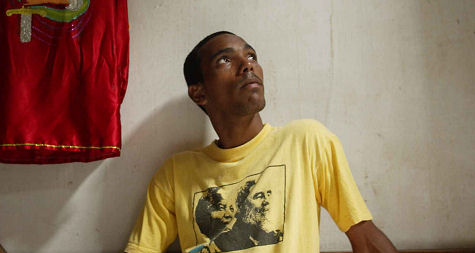
El Cartel’s Mikki Flow in Jauretsi Saizarbitoria’s East of Havana
Each film has its own style and aesthetic, but Saizarbitoria’s film is quite different than the other two, and not just because Charlize Theron produced it.
Caught earlier this week at South by Southwest by HE columnist Moise Chiullan, Havana is about the popularity of underground rap groups in Cuba and particularly three members of El Cartel, one of a small number of rapper groups in the suburbs of Havana.
< ?php include ('/home/hollyw9/public_html/wired'); ?>
There are two things that set El Cartel apart from standard-issue American rappers — gender equality (a relatively rare thing in hip-hop circles) and sharply political lyrics.
Instead of rapping about bitches, ho’s and flashing dough around, Cartel’s Mikki Flow, Soandry and Magyori (i.e., a female) tell stories about the daily struggle of living in post-Soviet Cuba .
The story surrounds the cancellation — censorship — of Cuba’s annual Rap Festival in 2004. Government representatives say it was due to hurricane damage, but the homie-in-the-street view is that The Man is keeping them down.
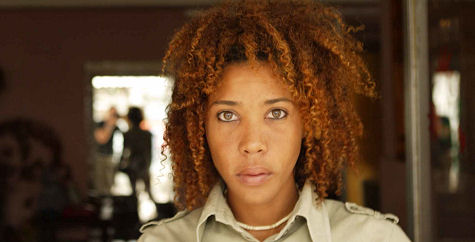
Magyori, also of El Cartel
The film says something quite interesting, which is that as much as Cuban citizens may fear the power of the government, the government fears its people and their freedom of expression exponentially more. Political unrest isn’t ebbing away. Poverty is worsening, economic resources are being more and more depleted, and Cuba’s long-standing dictator Fidel Castro is getting older every day.
Most Americans are unaware of the crushing effect of the Cuban embargo, and how 90 miles from the U.S. lies an island nation where there are computers but no internet and music but no iPods. But life moves along and things happen “por invento” — i.e., by invention.
Living life the Cuban way is a central concept to the poetry these rappers create: they use their passion and pain to distill literate, provocative lyrics that leave a profound impression on you. Their rap pounds to the rhythm of el corazon del barrio (the heart of the ‘hood) and uses this evolving art form to its pinnacle.
When word spread around South by Southwest crowds that Theron was Havana‘s producer, there was talk all over about her “doing it for credibility” or “trying to make it look like she cares.” Not quite so. The directors and producers of East of Havana have known Theron since she came to the U.S. from South Africa. They also acted as a surrogate family for her when she was “this little South African girl who didn’t speak any English.”
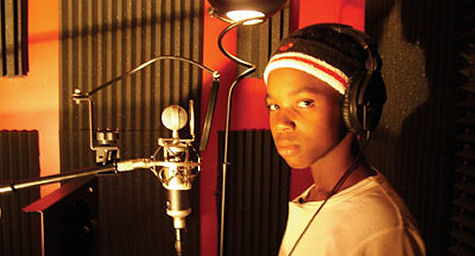
Denzel Lovett, a 14 year-old rapper, in George Biddoes’ Rampage
East of Havana almost didn’t happen, as the filmmakers made it into Cuba just a few weeks before President Bush further clamped down on travel to Cuba. Too bad — the El Cartel crew has expressed a strong desire to travel around and explore other cultures, given the opportunity.
Wim Wenders The Buena Vista Social Club showed us one side of Cuban music and culture, but East of Havana finally reveals the voice of contemporary Cuban youth and the rise of a very different new generation.
Look for more about this film in the coming months, as it was one of the most heavily-buzzed films of the festival.
Haiti, Sex, Death
Before last Sunday night I thought of Haiti as a hopeless Caribbean shithole, one of the worst places to live in the world because the government corruption and the politically-motivated beatings and killings never seem to stop, and because the poverty levels for most of the citizens are beyond belief.
I still see Haiti as an island most foul, but a knockout documentary called Ghosts of Cite Soleil, a kind of Cain-and-Abel story that was filmed just before, during and after the overthrow of Haitian president Jean Bertrand Aristide in March 2004, has added a new dimension.
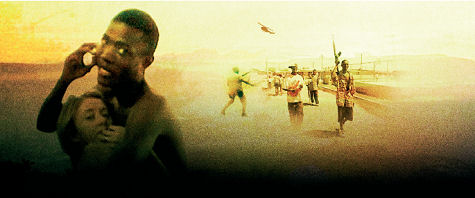
The real-life 2pac and Lele as they appear in Asger Leth’s Ghosts of Cite Soleil
I now see Haiti as less of a Ground Zero for abstract political terror and more of a place where people on the bottom rung are trying to live and breathe and create their own kind of life-force energy as a way of waving away the constant hoverings of doom.
In short, this excellent 88-minute film, directed by Asger Leth (the son of Danish filmmaker Jorgen Leth), adds recognizable humanity to a culture that has seemed more lacking in hope and human decency than any other on earth. I saw it at the Wilshire Screening Room two and a half days ago, and it’s been a kind of growth experience for me. I feel like I almost “get” Haiti now, and I haven’t stopped telling people about it since.
Everyone will say that Ghosts is City of God but in ‘real’ verite terms…and it is that, of course. But it’s less about violent street crime than stink-from-the-head Haitian politics, and it explores an unusual romantic triangle between a white French female relief worker namd Lele and two gangster brothers, 2pac and Bily (not “Billy”), and it has a tragic ending that touches you as much as any well-crafted Hollywood tearjerker could…and yet it happened all on its own.
2pac and Bily are in no way the “good guys,” but in a way they are. They wave guns around and talk all the time about defending their territory or making an enemy back off or perhaps having to kill each other, but somehow the film makes them seem like half-sympathetic pawns…somewhat vulnerable sociopaths desperately trying to escape from their cage.
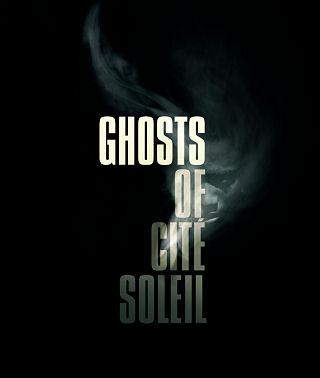
The brothers were leaders of gangs (there were five altogether, all of them known as “the Chimeres”, which is French for “ghosts”) who were being paid big money by the Aristide government to rough up or in some cases eliminate political oppo- nents. Director George Hickenlooper (Factory Girl), who invited me to Sunday’s screening in his capacity as one of the doc’s exec producers, said 2pac and Bily received “hundreds of thousands” of dollars.
When Aristide was finally forced out of office 2pac and Bily were suddenly targets of the new guys in power who wanted to get rid of all remnants of Aristide’s reign, including the “muscle.”
What was special in the making of Ghosts of Cite de Soleil was that Leth had totally open access to both brothers (as well as their government opponents), and also that life played out like a story written by a skilled dramatist.
This is precisely what Ghosts of Cite de Soleil could be the next time — a dramatic movie shot on location in Haiti with actors, a script, grips, electricians, etc.
On Monday I spoke with Cary Woods, the doc’s executive producer, who agreed that Ghosts of Cite Soleil could become a mainstream feature because (and this is primarily me talking) it has all the Shakespearean elements: poverty, political warfare, corruption, the cycle of violence, Cain and Abel, a romantic triangle, and a tragic finale.
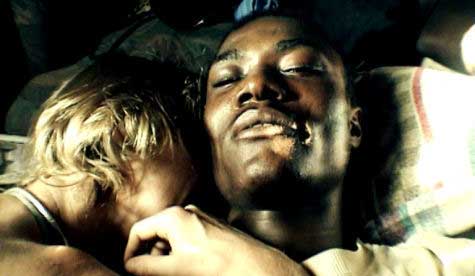
And as a scripted feature it could get a bit more into the warring-brothers- sleeping-with-the-same-woman thing, which the doc doesn’t really run with.
Woods told me that a certain big-name actress has expressed interest in playing the Lele character if and when a script is written and a film is up and rolling, and then producer Seth Kanegis called me from somewhere in the Caribbean Tuesday afternoon and said Woods is looking to hire a distinguished, big-name writer to do the screenplay.
This would be a perfect feature for Oliver Stone, Alejandro Gonzalez Innaritu, Werner Herzog…any director who could take the grit and social squalor of Haiti’s Cite de Soleil and reenact the story with feeling and realism.
The thing that needs to happen right now is for Ghosts of Cite Soleil to be accep- ted into the Cannes Film Festival’s Director’s Fortnight section so the festival-scout community can see it and talk it up. And then it should go to Toronto Film Festival in September, which would probably lead to some kind of distribution deal.
A film like this can only do what it can do. Film buffs and admirers of hot-button filmmaking and drama-in-the-rough will go for it, but some movigeoers would probably have a bit of difficulty with a film of this sort…a raw-looking, hand-held video piece about killings and squalor and interracial sex.
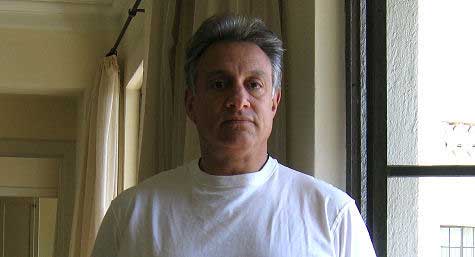
Ghosts executive producer Cary Woods
The feature that could come from this — that’s the thing. But there are miles to go before that happens…if it happens at all. Life is a gamble and movies are about rolling stones slowly uphill.
I haven’t mentioned the Wylcef Jean hip-hop on the soundtrack (the Haitian-born musician is also one of the film’s exec producers) and 2pac’s seeing himself as a burgeoning hip-hopper and his dream of becoming a musician-star. A Wyclef Jean soundtrack CD of some kind would, I understand, be part of the Ghosts package when and if it opens theatrically. I’m not 100% sure about this, but it would make sense.
Look for more about this film in the coming months, as it was one of the most heavily-buzzed films of the festival.
A guy was telling me
A guy was telling me he’d just left a project on amicable terms after the usual creative differences, and I contended there’s no such thing as an amicable parting over creative matters. All right, it may happen once in a blue moon, but most of the time it’s like what director-writer Nicholas Meyer once said about creative differences with a now-deceased producer named Stephen J. Friedman (All of Me, The Big Easy), whom he happened to despise, having once called him “that horrible man.” Maybe someone else said it first, but I’ve remembered Meyer’s remark about his clash with Friedman: “I was creative and he was different.”
Having stuck my neck out
Having stuck my neck out on Sidney Lumet’s Find me Guilty early on, calling it “clearly Lumet’s best film since Q & A, and before that Prince of the City,” it’s nice to be in the supportive company of the L.A. Weekly‘s Scott Foundas (who called it Lumet’s “best picture since the 1970s”), L.A. Citybeat‘s Andy Klein (“Lumet’s best in a decade”), and the N.Y. Times‘ Stephen Holden (“near the top of his game, this master surveyor of the urban jungle still has the machinery of police work and courtroom ritual down cold”).
With every word and keystroke
With every word and keystroke today I feel like Gregory Peck climbing up that straight-up cliff face in The Guns of Navarone …in the dead of night, in the rain, the wind howling. I can’t decide whether to play catch-up and write some more stuff, or just hunker down and finish reading Paul Haggis’s script of Flags of Our Fathers, which I was going to do a lead piece on today. So I’m doing both and not getting very far with either. If anyone’s read the Fathers script and wants to contribute, send me something today or tonight.
C-drive issues come up every
C-drive issues come up every so often that drive you nuts…like someone or something has poured a bottle of Elmer’s Glue into the gut of your computer. Re-start, clean up, defrag, buy a new backup hard drive…it can go on and on.
If I were running a
If I were running a production company I’d be thinking about ways of bringing in some of that Christian-right moolah like everyone else, but the more I think about Nativity, Catherine Hardwicke‘s drama about the life of the Virgin Mary with Whale Rider‘s Keisha Castle-Hughes in the title role, the more problematic it seems. I haven’t spoken to anyone and I haven’t read Mike Rich‘s script, but Hardwicke’s turf so far has been hardscrabble So-Cal angst and dysfunction (Lords of Dogtown, Thirteen) and suddenly she’s off to ancient Judea? I know, I know…Martin Scorsese and his New York urban outlook handled Christ’s life in a sublime and wondrous way with The Last Temptation of Christ (’88) so why can’t Hardwicke be given the same benefit of the doubt? Maybe that’s the way to process this, but Nativity isn’t a pure Hardwicke enterprise. It’s supposed to be a Mary story with “a strong female perspective” but Harwicke’s teammates are all guys with what seem to me like urban hot-shot, slick-ass attitudes. One of her Nativity producers is former UTA agent Marty Bowen, whose clients included screenwriter Charlie Kaufman, who memorably satirized Bowen in that scene in Adaptation when Nic Cage’s agent, played by Ron Livingston, said during a meeting, “See that girl over there? I fucked her in the ass.” And take a look at Nativity‘s other producer Wyck Godfrey, who is Bowen’s new partner. (Does he look to you like the kind of guy who “gets” the hardcore-Catholic Virgin Mary trip? With that beard and that hustler-on-the-Croisette smile? I’m just asking.) And consider the resumes of Nativity‘s New Line overseers — Cale Boyter, Toby Emmerich, Michael Disco — who’ve worked on nothing but blatantly commercial New Line-y genre pieces. The only half-encouraging element is Rich, whose script of The Rookie had a nice emotional dignity. That aside, this just doesn’t seem like the right kind of crew to be pooling forces on a Biblical-era drama, leaving aside the obvious pandering element of making a Virgin Mary flick to begin with. And “a strong female perspective” means what exactly…a feminist perspective? Joseph was an insensitive pig, ancient Judea was an oppressive patriarchal society but Mary fulfilled her destiny anyway… something like that? The whole thing sounds abundant with the potential for being out-of-whack and flat-out dreadful. Not that I want to see this happen especially…it would be great if it works, and Castle-Hughes has something special.
“Sex/Nudity: 4 scenes of innuendo,
“Sex/Nudity: 4 scenes of innuendo, 1 scene of a near rape, and 1 scene with nude bodies in a mass grave. Violence: 28 scenes. Profanity: 48 instances, including 12 harsh ones. Drugs/Alcohol/Tobacco: 8 scenes of smoking and/or drinking.” — posted at conclusion of Peter Rainer‘s Christian Science Monitor review of V for Vendetta.
